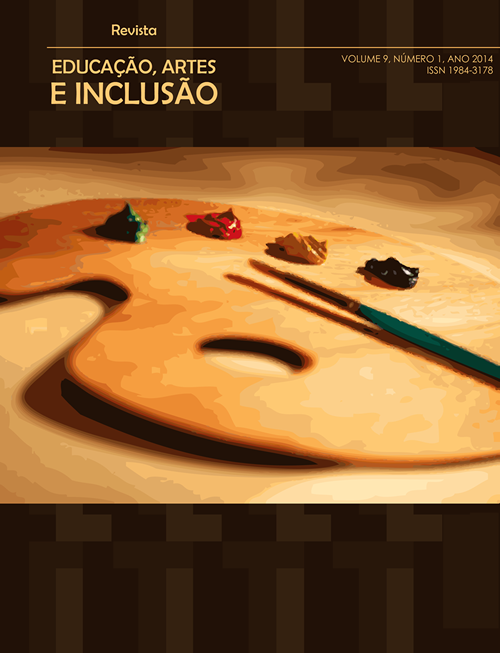LÍNGUA BRASILEIRA DE SINAIS EM CONTEXTO: INCLUSÃO DOS INDIVÍDUOS SURDOS
DOI:
https://doi.org/10.5965/19843178912014034Keywords:
LIBRAS. Contexto. Inclusão. Ensino. Indivíduos Surdos.Abstract
É notória a importância que a Língua Brasileira de Sinais adquire no universo dos surdos e, como um dos elementos constitutivos desse valor, podemos apontar a concretização da comunicação antes impossibilitada em decorrência da surdez. A presente pesquisa tem por objetivos traçar um escorço histórico das Línguas de Sinais a partir da criação de metodologias educacionais que possibilitaram o desenvolvimento cognitivo dos indivíduos surdos, isto é, conhecer o contexto histórico das metodologias educacionais que foram e podem ser aplicadas ao ensino dos surdos. Nessa perspectiva, o presente trabalho justifica-se pelo fato de que há a necessidade de se discutir a inclusão desses indivíduos através de sua língua materna, pois, socialmente eles sempre foram excluídos da sociedade. Assim, uma pesquisa direcionada a este interesse de conhecer a língua desses indivíduos enquanto ferramenta de inclusão possibilita aprofundar a produção científica nesta área do conhecimento. Para sua construção será utilizado obras de autores como Quadros e Karnopp (2004), Magalhães (2011), Salles (2004) e dentre outros que contribuíram significativamente para temática, sendo assim classificada, como pesquisa bibliográfica. Como resultados este estudo buscará apresentar a Língua de Sinais como a possibilidade mais viável para inclusão dos surdos no contexto social e escolar, tendo em vista que é através dela que os surdos podem desenvolver a comunicação, e também, estarem incluídos no processo de ensino/aprendizagem efetivamente.Downloads
Downloads
Published
How to Cite
Issue
Section
License
Copyright Statement
The Educação, Artes e Inclusão is a journal that follows the Free Access Policy. The articles published by the journal are free of charge, intended for educational and non-commercial applications. The articles whose authors are identified represent the expression from the point of view of their authors and not the official position of the Educação, Artes e Inclusão Journal or the Educação, Artes e Inclusão Research Group.
Authors who publish in this journal agree to the following terms:
(A) Authors retain the copyright and grant the journal the right of first publication, with the work simultaneously licensed under the Creative Commons Attribution License which allows the sharing of the work with acknowledgment of authorship and initial publication in this magazine.
(B) Authors are authorized to take additional contracts separately, for non-exclusive distribution of the version of the work published in this journal (eg publish in institutional repository or as a book chapter), with acknowledgment of authorship and initial publication in this magazine.
(C) This journal provides public access to all of its content, as this allows for greater visibility and scope of published articles and reviews. For more information on this approach, visit the Public Knowledge Project.
This journal is licensed under a Creative Commons Attribution-NonCommercial-ShareAlike 4.0 International License. This license allows others to remix, adapt and create from your work for non-commercial purposes, and although new work must give you due credit and cannot be used for business purposes, users do not have to license such derivative works under the same terms.



